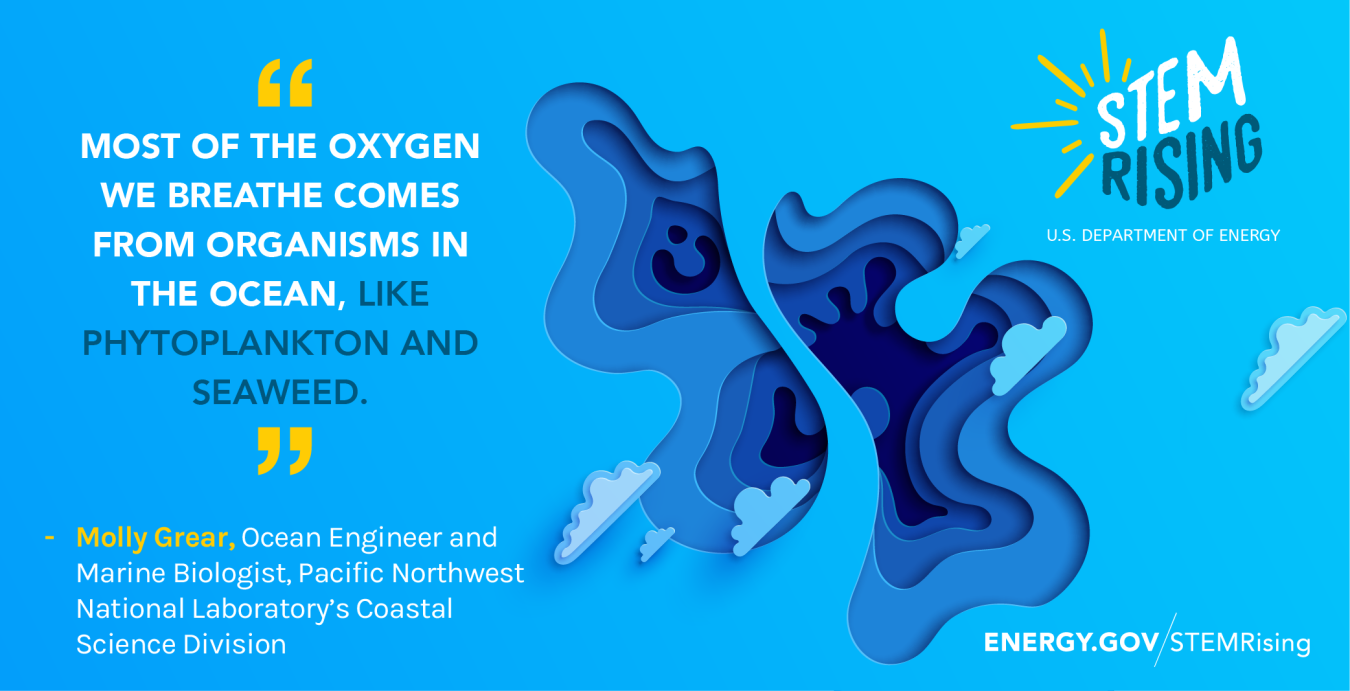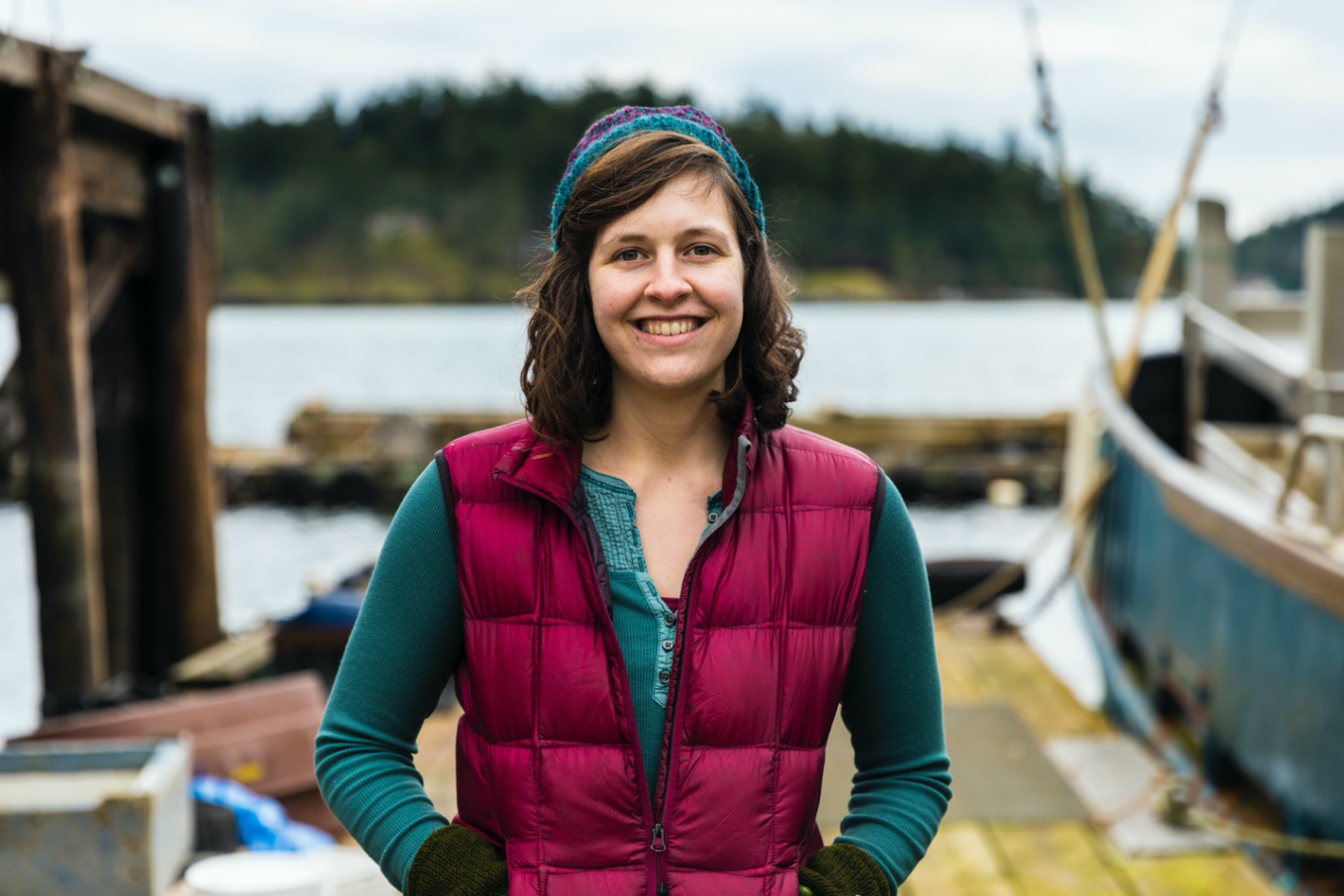Learn why Molly Grear loves her job as an ocean engineer and marine biologist with Pacific Northwest National Laboratory.
June 30, 2020
June is Ocean Month, and to celebrate STEM Rising is sharing profiles of Energy Department staff in ocean-related careers. Meet Molly Grear.
My name is Molly Grear and I am an ocean engineer and marine biologist working in the Coastal Sciences Division at Pacific Northwest National Laboratory. My work focuses on the environmental impacts of installing new ocean technology, as well as using biological processes and mechanics to inspire engineering design. My recent work included coastal modeling projects, such as understanding the impacts of storms on coastal infrastructure, resource assessment for wave energy, and modeling of offshore macroalgae cultivation. Before joining PNNL in 2020, I led the National Science Foundation's portfolio in ocean science and technology policy.
I have a PhD in civil and environmental engineering from the University of Washington, where I studied the potential injury risk of marine mammals from tidal turbine collision through testing and modeling the structural mechanics of whale skin and blubber.

What’s your favorite fact about the ocean?
Most of the oxygen we breathe comes from organisms in the ocean, like phytoplankton and seaweed.
What do you do to celebrate Ocean Month?
In past years, I’ve enjoyed tuning into more webinars and conferences that highlight how the ocean can be a lens to understand and mitigate some of the toughest problems we face, like climate change and species conservation. At last year’s Capitol Hill Ocean’s Week conference, there was a memorable panel on next generation technology to study and project whale populations. I like the celebration of innovation combined with tackling challenging environmental problems.
This year, however, I’m celebrating Ocean Month by taking a step back to reflect on how little diversity there is in the ocean science research community. With intractable problems like ocean acidification and climate change to solve, it’s obvious we need all hands on deck. I’m hoping that this Ocean Month (and beyond!), the ocean sciences community can take a deeper look at the systemic forces that have led to that lack of diversity and start to bridge the gap.
What inspired you to work in water power?
Working in renewable energy has been a goal of mine for a long time, so when I was choosing a project for my senior thesis in college, I was excited to work with a company making a run of the river turbines. This technology has the potential to be much more environmentally than traditional dams. From there, I started my first job at PNNL in 2012. The field has been really exciting to me because we’re designing a new technology, so I’ve always felt there was a lot of creativity and excitement in that!
What do you do in your job?
On some lucky occasions I can spend the day collecting data on the beach or on a boat, but usually I am working on the computer. For those few days I spend in the laboratory or in the field, there is a lot of work to do analyzing the data, writing up the results, and thinking about what the next directions should be for the research.
What books or movies about the ocean do you recommend?
I’ve been searching and reading looking for some really great ocean science fiction books, but this sadly isn’t a very large genre. Much like space, I think the ocean can inspire our sense of adventure and mystery—perhaps even dreams of utopias! I’d love to see this genre of books or movies grow in the coming decade, as I think it can inspire young folks to do ocean science.
I’m currently reading The Outlaw Ocean, which takes you to remote parts of the ocean to explore some of the most wild and exploitative industries. I haven’t finished it, but so far would recommend!
You can come into ocean-related careers from so many paths! From biology, policy, engineering, ecology, geography, to history and anthropology—I’ve met folks working in the field who have all of those backgrounds. Because of that, I think ocean sciences is a pretty interdisciplinary field. As with lots of careers, it’s important to build your teamwork and communication skills to work across disciplines and be able to see the ocean as a big system, as opposed to just one specific field.
Read more Ocean Month profiles and get STEM resources at the STEM Rising website.

